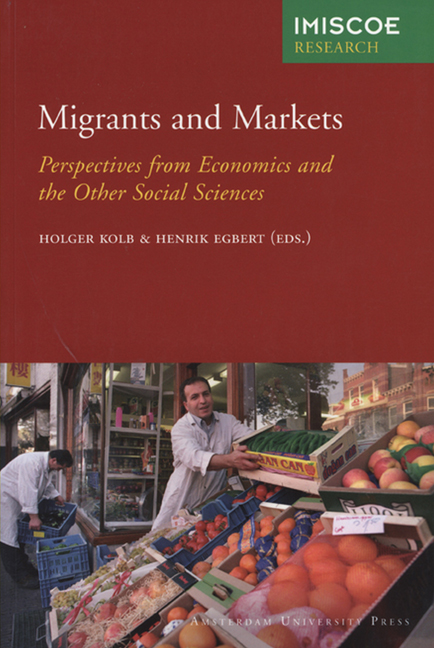Book contents
- Frontmatter
- Contents
- Introduction: Migrants and Markets: Perspectives from Economics and the Other Social Sciences
- The Impact of Immigration on the Labour Market: A Survey
- Investigating the Economic Impact of Immigration on the Host Country: The Case of Norway
- The Exit Option of Labour Migration from East to West Germany: Individual and Contextual Determinants of Unemployed Workers’ Geographic Mobility
- How Recent Amendments in German Immigration Law Affect Decisions: The Case of Polish Doctors
- Educational Selectivity and Labour Market Attainment of Jewish Immigrants from the Former Soviet Union in Israel and Germany in the 1990s
- States as Clubs? The Political Economy of State Membership
- Chinese Student Migration in Europe: A Migration That Nobody Objects To?
- Assessing Interdependencies between Sector Structures and Labour Migration: A Comparative Study of the British and the German Health Sectors
- Workers’ Remittances and International Risk Sharing
- Skills and Remittances: The Case of Afghan, Egyptian and Serbian Immigrants in Germany
- The Impact of Migration on Foreign Trade in Bolivia
- List of Contributors
- Other IMISCOE Titles
Chinese Student Migration in Europe: A Migration That Nobody Objects To?
Published online by Cambridge University Press: 02 February 2021
- Frontmatter
- Contents
- Introduction: Migrants and Markets: Perspectives from Economics and the Other Social Sciences
- The Impact of Immigration on the Labour Market: A Survey
- Investigating the Economic Impact of Immigration on the Host Country: The Case of Norway
- The Exit Option of Labour Migration from East to West Germany: Individual and Contextual Determinants of Unemployed Workers’ Geographic Mobility
- How Recent Amendments in German Immigration Law Affect Decisions: The Case of Polish Doctors
- Educational Selectivity and Labour Market Attainment of Jewish Immigrants from the Former Soviet Union in Israel and Germany in the 1990s
- States as Clubs? The Political Economy of State Membership
- Chinese Student Migration in Europe: A Migration That Nobody Objects To?
- Assessing Interdependencies between Sector Structures and Labour Migration: A Comparative Study of the British and the German Health Sectors
- Workers’ Remittances and International Risk Sharing
- Skills and Remittances: The Case of Afghan, Egyptian and Serbian Immigrants in Germany
- The Impact of Migration on Foreign Trade in Bolivia
- List of Contributors
- Other IMISCOE Titles
Summary
Introduction
Relationships between Europe and China are now an important factor in shaping European integration, and China presents a new frontier for European foreign policy. China's booming economic development has a profound effect on the global economy, with concomitant demanding implications for the EU member states.
Migration is one of the most debated global issues in our contemporary society. It poses both vast opportunities and inevitable challenges for sovereign nation states around the world. Over the past fifteen years, Europe has seen an increasing influx of migration from China, both through legal as well as illegal channels. On the one hand, this is a clear indication of the growing trade and economic relations between China and Europe. On the other hand, the management of migratory flows and in particular of those of an irregular nature remains a sensitive area of negotiation.
Meanwhile, Chinatowns can be found in each European capital, from Amsterdam to Madrid. With the enlargement of the European Union, Chinese communities have also spread from ‘old’ (Western) to the ‘new’ Europe, for instance, Budapest and Bucharest are now two major focus points for Chinese communities. The migration pattern of Chinese people in Europe is becoming more diverse, with student migration being the most striking feature. As a form of (highly skilled) labour migration, the movement of students has emerged as the new dynamism of international migration. This is evident, for example, in the huge inflow of Chinese students into Europe, particularly to the United Kingdom. It is said to constitute an important social network linking China and Europe. The UK's New Statesman has, for example, labelled Chinese student migration, ‘a migration that nobody objects to’ (New Statesman, March 1, 2004). How true is this statement? How many Chinese students are in Europe, what do they do and how well are they integrated into the host societies? Without doubts, student migration brings deep social and economic impacts on Europe, as well as on the economic sustainability and development of China, and they are important transnational actors and network agents that require both better support and governance to maximise the benefits for both parts.
- Type
- Chapter
- Information
- Migrants and MarketsPerspectives from Economics and the Other Social Sciences, pp. 147 - 167Publisher: Amsterdam University PressPrint publication year: 2008
- 1
- Cited by



